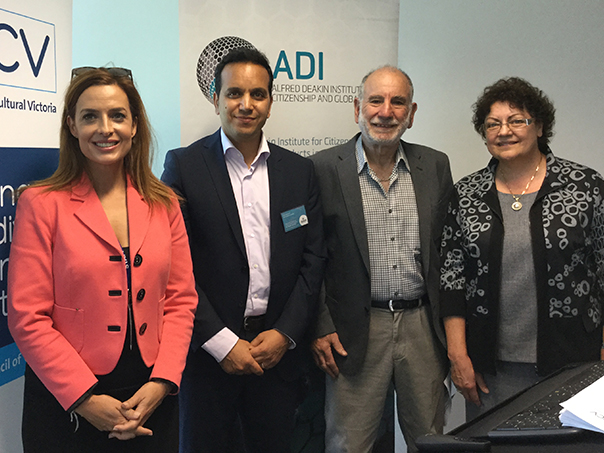Two day conference showcases expert thinking on Muslim Question, citizenship and racism
Research news
An insight into the experiences of Muslims and Muslim communities in three cities, Melbourne, Detroit and Lyon and the role religion plays in fostering local and national belonging was among research presented at the Alfred Deakin Institute for Citizenship and Globalisation’s major conference in Melbourne.
The two day conference was full of highlights. Pictured at the launch of the Intergenerational Relations in Newly-Arrived Communities in Victoria: A Pilot Study from left Victorian Multicultural Commission’s chairperson, Helen Kapalos, Director of the Alfred Deakin Institute for Citizenship and Globalisation, Professor Fethi Mansouri, Chair of the Ethnic Communities’ Council of Victoria Eddie Micallef, and ECCV Executive Officer Dr Irene Bouzo
An insight into the experiences of Muslims and Muslim communities in three cities, Melbourne, Detroit and Lyon and the role religion plays in fostering local and national belonging was among research presented at the Alfred Deakin Institute for Citizenship and Globalisation’s major conference in Melbourne.
The conference was officially opened by the Victorian Multicultural Commission’s chairperson, Helen Kapalos and Victorian MP for Broadmeadows, Hon Frank McGuire MLC.
Director of the Institute and one of the convenors, Professor Fethi Mansouri, said the conference came at a critical time as public discussion around Islamic belief, ritual and practice— and its connection to Australian citizenship — has become ever more volatile.
“Unfortunately since September 11, with the emergence of ISIS, the attacks in Paris and the United States, the place of Islam in western societies has been consistently framed by a "clash of civilisations" narrative,” he said.
“While understandable, this approach only makes people more scared and leads to displays of nationalism and outright racism directed at the Muslim community.
“The conference and the research provided a platform for considered and informed discussion.
“It also showcased the latest empirically backed thinking “
Professor Mansouri said opening the conference discussion was an exploration of Muslims’ religious practices in three Western cities using insights from an Australian Research Council funded discovery project. (Islamic Religiosity and Challenge of Political Engagement and National Belonging in Multicultural Western Cities) to be launched in 2016.
“The case of Islamic religiosity in Australia is an interesting one for several reasons,” he explained.
“First, according to the 2011 Census there are 476,300 Muslims in Australia (2.2% of the population) (ABS 2012).
“Yet Muslims evoke a disproportionately negative public response when compared to other religious groups in Australia.”
Professor Mansouri said there was a public (mis)perception that Muslims were somehow not playing an active part in being an Australian citizen because of their supposed religiosity and faith-based practice.
“In fact, there is a perception that an intensity of religious affiliation is portrayed as an ‘excess’ that is hard to contain and which might have dangerous outcomes like violent extremism,” he said.
“Our findings don’t provide evidence for these misperceptions.
“They show that religious practice is grounded in a duty of care towards all of God’s creations firstly by obeying the laws of the land, but secondly through local attachments with respecting one’s neighbour and working towards a ‘common good’.
“There is no ‘clash’ between Islamic ethos and notions of good citizenship within society.”
Professor Mansouri said other topical research presented over the two days included:
- Professor Kevin Dunn on ‘Muslim Australians and resilience’
- Associate Professor Adam Possamai examination of Muslims’ practice of Shari’a Law
- Dr Joshua M. Roose presentation looking at the paradox between young Muslims from migrant backgrounds who are actively buying in to Australian conceptions of citizenship and belonging and young Australian born Muslims who are rejecting the society they are born into and declaring their loyalty to the Islamic state movement;
- Dr Nahid Afrose Kabir’s research looking at young Victorian Muslims’ identity and their sense of belonging and how they find themselves situated in the ‘Muslim Question’;
- Melinda Herron’s paper looking at how high school students in the City of Casey confront and live among difference and diversity in their everyday lives.
Share this story

